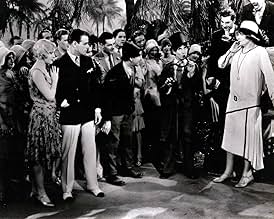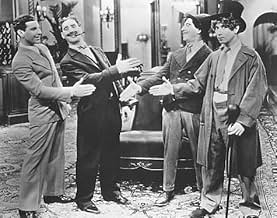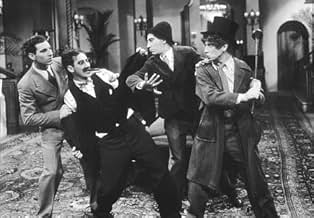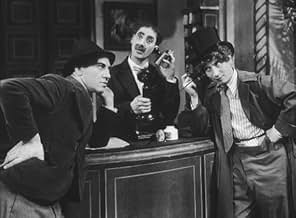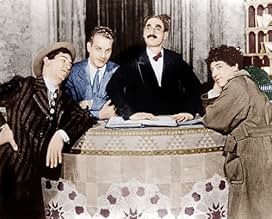IMDb-BEWERTUNG
6,8/10
8549
IHRE BEWERTUNG
Während des Landbooms in Florida betreiben die Marx Brothers ein Hotel, versteigern etwas Land, vereiteln einen Juwelenraub und verhalten sich im Allgemeinen wie sie selbst.Während des Landbooms in Florida betreiben die Marx Brothers ein Hotel, versteigern etwas Land, vereiteln einen Juwelenraub und verhalten sich im Allgemeinen wie sie selbst.Während des Landbooms in Florida betreiben die Marx Brothers ein Hotel, versteigern etwas Land, vereiteln einen Juwelenraub und verhalten sich im Allgemeinen wie sie selbst.
- Regie
- Drehbuch
- Hauptbesetzung
- Auszeichnungen
- 2 Nominierungen insgesamt
Groucho Marx
- Hammer
- (as Marx Brothers)
Harpo Marx
- Harpo
- (as Marx brothers)
Chico Marx
- Chico
- (as Marx Brothers)
Zeppo Marx
- Jamison
- (as Marx Brothers)
Gamby-Hale Ballet Girls
- Dancers
- (as Gamby-Hale Girls)
Dolores Hope
- Dancer
- (Nicht genannt)
Sylvan Lee
- Bell Captain
- (Nicht genannt)
Barton MacLane
- Lifeguard
- (Nicht genannt)
Empfohlene Bewertungen
A lot of people don't find The Cocoanuts to be as entertaining as some of the later Marx Brothers films. Maybe not, but it definitely comes close. Personally, I thought this was the Marx Brothers' fifth best film. It's not that it's bad, because it great, but it's just not as good as some of the others, that's all.
As several other people have said, it really doesn't stand up technically as well as most of the others, but that has nothing to do with the quality of the script, which is just great. I truly believe that if I had seen this in 1929, I would have been as hooked on the Marxes as I am now.
There are many great bits in this movie, including the first scene between Groucho and Chico, the Auction, the connected bedroom thing, and the first time we ever see Groucho do his thing with Margaret Dumont. But the only scene in this movie to make my personal Ten Best Marx Scenes is the Why-A-Duck routine. Genius, it's just pure genius. That's my only word for it.
Harpo really doesn't have a lot of good stuff in this movie. He's great in what he doesn't have, but he really shines in Monkey Business and Duck Soup. Those are his two best performances, if you ask me. If you are looking for classic Harpo, I'd suggest watching either of those. Also, Zeppo, obviously, has nothing to do. But then, what did you expect?
This movie has a few actually rather unfunny spots in it, but you can blame that on the fact that this is the brothers' first movie, and they are still getting used to the camera. But it has a lot more comedy than non-comedy and is still a whole lot better than most of the "comedies" that are coming out nowadays.
This may sound a little strange, but if you have never seen a Marx Brothers movie, I suggest watching this one first. It's a lot more enjoyable if you aren't expecting it to be equal to Duck Soup or Animal Crackers. Because it's not. But, as I can not stress enough, it is still worth checkout, and better than than anything they did post-A Night at the Opera.
Well, it's the Marx Brothers best movie of the 20's, anyway.
8/10
As several other people have said, it really doesn't stand up technically as well as most of the others, but that has nothing to do with the quality of the script, which is just great. I truly believe that if I had seen this in 1929, I would have been as hooked on the Marxes as I am now.
There are many great bits in this movie, including the first scene between Groucho and Chico, the Auction, the connected bedroom thing, and the first time we ever see Groucho do his thing with Margaret Dumont. But the only scene in this movie to make my personal Ten Best Marx Scenes is the Why-A-Duck routine. Genius, it's just pure genius. That's my only word for it.
Harpo really doesn't have a lot of good stuff in this movie. He's great in what he doesn't have, but he really shines in Monkey Business and Duck Soup. Those are his two best performances, if you ask me. If you are looking for classic Harpo, I'd suggest watching either of those. Also, Zeppo, obviously, has nothing to do. But then, what did you expect?
This movie has a few actually rather unfunny spots in it, but you can blame that on the fact that this is the brothers' first movie, and they are still getting used to the camera. But it has a lot more comedy than non-comedy and is still a whole lot better than most of the "comedies" that are coming out nowadays.
This may sound a little strange, but if you have never seen a Marx Brothers movie, I suggest watching this one first. It's a lot more enjoyable if you aren't expecting it to be equal to Duck Soup or Animal Crackers. Because it's not. But, as I can not stress enough, it is still worth checkout, and better than than anything they did post-A Night at the Opera.
Well, it's the Marx Brothers best movie of the 20's, anyway.
8/10
A brilliant film debut by the Marx Brothers in this 1929 musical comedy (from Broadway) about land speculation in Florida, jewel thieves, and well the Marx Brothers. In their first film, all the familiar schtick and word play are already in place with Groucho, Chico, and Harpo all excellent.
As usual there is also a romantic young couple--Mary Eaton and Oscar Shaw--and bad guys--Kay Francis and Cyril Ring. Also making her film debut at age 40 is the wonderful and imperious Margaret Dumont. Basil Ruysdael plays the house detective. Zeppo Marx plays the desk clerk.
A blah ballad is sung to death, but The Monkey Doodle-Doo song is terrific and well sung and danced by Eaton (a Broadway star) and chorus. Oddly staged productions number with chorus in monkey suits and tourists milling about in the background. But Eaton is quite good, considering the early sound equipment. And she has great legs.
Francis is fun in her second film (she made five in 1929) but teamed with the unappealing Ring. Shaw is OK but seems too old to be playing the juvenile lead.
But while Dumont, Francis, and Eaton are fun, it's the 3 brothers who dominate the film. Several classic bits, including the viaduct gag, Chico's great piano solo, Harpo getting to steal a few scenes, and of course Groucho riding roughshod over everyone. What a treat! While Kay Francis went on to major stardom in the 30s, Mary Eaton made one disastrous film after this hit, Flo Ziegfeld's Glorifying the American Girl. That ended her starring career in Hollywood.
The more I watch the Marx Brothers the more I appreciate Chico, who was always my least favorite of the 3. Now I notice his perfect comic timing and I just love his piano solos.
As usual there is also a romantic young couple--Mary Eaton and Oscar Shaw--and bad guys--Kay Francis and Cyril Ring. Also making her film debut at age 40 is the wonderful and imperious Margaret Dumont. Basil Ruysdael plays the house detective. Zeppo Marx plays the desk clerk.
A blah ballad is sung to death, but The Monkey Doodle-Doo song is terrific and well sung and danced by Eaton (a Broadway star) and chorus. Oddly staged productions number with chorus in monkey suits and tourists milling about in the background. But Eaton is quite good, considering the early sound equipment. And she has great legs.
Francis is fun in her second film (she made five in 1929) but teamed with the unappealing Ring. Shaw is OK but seems too old to be playing the juvenile lead.
But while Dumont, Francis, and Eaton are fun, it's the 3 brothers who dominate the film. Several classic bits, including the viaduct gag, Chico's great piano solo, Harpo getting to steal a few scenes, and of course Groucho riding roughshod over everyone. What a treat! While Kay Francis went on to major stardom in the 30s, Mary Eaton made one disastrous film after this hit, Flo Ziegfeld's Glorifying the American Girl. That ended her starring career in Hollywood.
The more I watch the Marx Brothers the more I appreciate Chico, who was always my least favorite of the 3. Now I notice his perfect comic timing and I just love his piano solos.
Entertaining, but not much of a movie. This first effort from the Marx Brothers seems more like a variety show than a narrative film. The brothers, themselves, are hilarious, especially when playing off each other, but they are forced to share the screen with too many other attractions. There is the singing, romantic lead, his girl, the villainess, her cohort, the surly old cop (who also sings) and even a chorus line of dancing girls thrown in for apparently no other reason than to have dancing girls in the film. The story is flimsy and the supporting cast is awful, but that is to be expected. On the upside, the movie is incredibly funny, and that, of course, is its only real aim. Groucho, Harpo and Chico make the film fly whenever they are given the chance. It just seems like the filmmakers didn't quite yet know what to do with them.
The Marx Brothers first motion picture and Paramount's first "all talking, all singing, all dancing" musical will delight fans of the Marx Brothers, musicals and early cinema alike. While dated and somewhat stagey, after all it *was* basically a filmed version of their hit Broadway show, it holds up better than many films of its day. Kaufman and Ryskind, who also wrote the stage show, wrote the screenplay with an eye to making the Marx Brothers wit appear spontaneous and natural. I remember how shocked I was when I first realized the boys were using a script!
The movie is laced with classics of Marxian comedy. The famous "Why a duck?" scene with Groucho and Chico (remember - it's pronounced Chick-o, not Cheek-o, because he was such a womanizer), Groucho answering the telephone at the hotel's front desk (Ice water? Ice water? Peel some onions. That'll make your eyes water.) and Harpo shaking hands with the house detective while all of the hotel silverware falls out of his coat pockets.
Margaret Dumont is priceless as the clueless matron. She claimed in later years it wasn't an act; she really had no idea what the brothers were doing. Regardless, she is the ideal foil for the boys as they tear into "polite" society.
Take a look at The Cocoanuts. You'll see the wellspring from which all that Marx madness flows.
Jon Brian Waugh
The movie is laced with classics of Marxian comedy. The famous "Why a duck?" scene with Groucho and Chico (remember - it's pronounced Chick-o, not Cheek-o, because he was such a womanizer), Groucho answering the telephone at the hotel's front desk (Ice water? Ice water? Peel some onions. That'll make your eyes water.) and Harpo shaking hands with the house detective while all of the hotel silverware falls out of his coat pockets.
Margaret Dumont is priceless as the clueless matron. She claimed in later years it wasn't an act; she really had no idea what the brothers were doing. Regardless, she is the ideal foil for the boys as they tear into "polite" society.
Take a look at The Cocoanuts. You'll see the wellspring from which all that Marx madness flows.
Jon Brian Waugh
"The Cocoanuts" is the very first film the Marx Brothers did and is essentially a filmed recording of their Broadway triumph. Talkies were still in their infancy, and the technical aspects of this flick prove it! The camera can barely keep up with the boys as they leap around. But don't let the staginess and crummy musical interludes and subplots distract you... this film has some of the great moments in Marx comedy. Chico is especially aggressive with his lines (he just annoys the hell out of Groucho, foiling his plan to rig an auction with his denseness) and Harpo (with his original red wig, which films dark brown) has never been better, destroying the hotel lobby by eating buttons off bellboy's uniforms and swilling ink. Groucho has some of his most potent insults. Zeppo, surprisingly, has even less to do here than in subsequent outings. This film is hilarious and head-and-shoulders above their later MGM films like "Go West" and "At the Circus." Funny, funny, funny!
Wusstest du schon
- WissenswertesDuring the "Why a duck?" sequence, it seems that Groucho Marx almost calls Chico Marx "Ravelli", which is Chico's character in Animal Crackers. Since they were shooting The Cocoanuts in the morning and acting in Animal Crackers at night, this mix up is understandable.
- PatzerIn the opening scene, Hammer sends Jamison to meet a 4:15 train. When Jamison gets back, he refers to it as a 4:30 train.
- Crazy CreditsThe opening credits are run against a background of negative film of the "Monkey-Doodle-Doo" number.
- Alternative VersionenDeleted Scenes:
- When the bellboys are protesting against being unpaid, Zeppo tells them that Groucho has yet to arise at four in the afternoon. His comforting postscript, that Groucho always gets up on Wednesday, precedes his arrival. This scene was shot, but later cut after the preview, leaving Groucho descending down the stairs, still putting on his coat, allowing time to ward off his staff to catch a 4:15 train.
- Another item that was cut from the preview version of the film was a love ballad sung by Groucho to Margaret Dumont entitled "A Little Bungalow". Originally sung in the play by the romantic leads Polly Potter and Robert Adams, the song slowed up the picture.
- VerbindungenFeatured in 46th Annual Academy Awards (1974)
- SoundtracksFLORIDA BY THE SEA
(1925) (uncredited)
Written by Irving Berlin
Sung off-screen by chorus
Danced by Gamby-Hale Ballet Girls and Allan K. Foster Girls
Top-Auswahl
Melde dich zum Bewerten an und greife auf die Watchlist für personalisierte Empfehlungen zu.
- How long is The Cocoanuts?Powered by Alexa
Details
- Erscheinungsdatum
- Herkunftsland
- Sprache
- Auch bekannt als
- Los cocos
- Drehorte
- Kaufman Astoria Studios - 3412 36th Street, Astoria, Queens, New York City, New York, USA(Paramount Astoria Studios site)
- Produktionsfirma
- Weitere beteiligte Unternehmen bei IMDbPro anzeigen
Box Office
- Budget
- 500.000 $ (geschätzt)
- Weltweiter Bruttoertrag
- 57 $
- Laufzeit1 Stunde 36 Minuten
- Farbe
Zu dieser Seite beitragen
Bearbeitung vorschlagen oder fehlenden Inhalt hinzufügen



